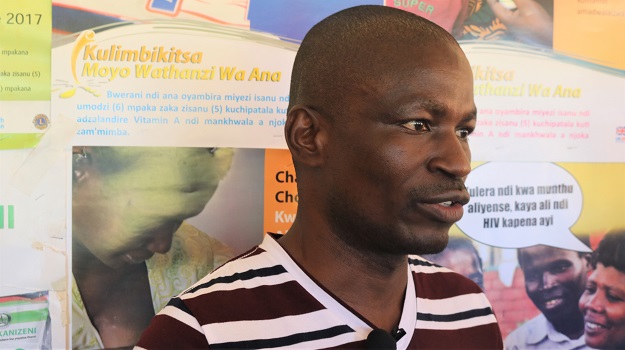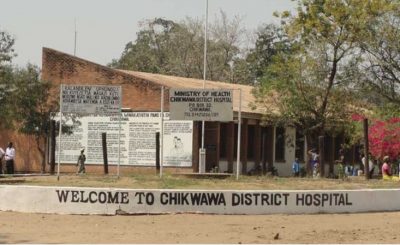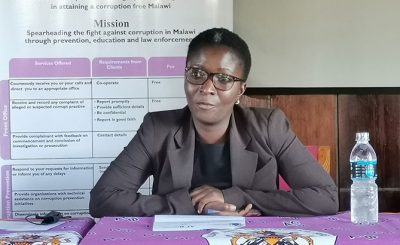Clad in a white dust coat and with a mobile phone in his right hand, Webster Chirwa dashes out of his office and heads to the heights of an anthill in search for good network reception.
It’s quite a hike, stretching about some two kilometres. The purpose of that hike is to call for an ambulance from Nkhata Bay District Hospital to Bula Health Centre where he works as Medical Assistant and in-charge.
The absence of mobile network in Bula leaves Chirwa with a huge task of calling for health support for pregnant women and under five children from surrounding communities.
“There is no tower here and network reception is so poor. I have to run up the hills just to report a referral case requiring an ambulance,” Chirwa laments.
Such a situation is said to result into women developing serious complications because of time wasted in reporting cases.
The situation worsens in rainy season when they have to wait for the rains to calm down before going for a hunt for network.
The safety of health personnel is also at risk.
“We sometimes encounter deadly snakes. My fear is that thugs will soon start taking advantage to harm us especially at night.”
Bula Health Centre lies 90 kilometres away from Nkhata Bay District Hospital. For a facility that serves close to 10,000 people from seven surrounding villages, the health centre needs access to good mobile network to ease communication challenges.
Spokesperson for Nkhata Bay District Hospital Christopher Singini admits that most health centres in the district are far away from mobile network service providers because of district’s hilly terrain.
“It’s a big challenge and the sooner we have mobile network reaching almost every place the better,” Singini says.
Lack of access to affordable, reliable and efficient information communication technologies (ICT) has become another challenge in the delivery of quality health services.
Executive Director for Malawi Health Equity Network (MEHN), George Jobe, says communication has always been an important aspect in provision of essential health services since time immemorial.
“In the past, health facilities had wireless message receivers for communication. They served their purposes well,” Jobe says.
He suggests that if the current technologies cannot serve hard to reach places, it is better to transfer those wireless receivers from places where there are now redundant to health facilities like Bula Health Centre.
Ministry of Health and Population spokesperson, Joshua Malango says efforts to improve maternal and child health needs support from all critical players including the telecommunication sector.
Timely and effective messages through good communication networks is of paramount importance to efficient health service delivery especially in maternal and child health, according to Malango.
“Any delays in timely communication can result in unnecessary maternal complications and contributes to increase in poor maternal and child outcomes,” he says.
Malango, therefore, calls on mobile phone companies to consider expanding their network coverage by erecting more towers in remotest areas.
Universal access to ICT services remains unfulfilled. There has been little translation in terms of implementation on some of the priority areas in the 2013 National Information and Communications Technology (ICT) Policy
Malawi Communications Regulatory Authority (Macra), the body supervising and monitoring the telecommunication sector, intends to establish a Universal Service Fund (USF) as mandated by the Communications Act of 2016.
USF will serve as a springboard to accelerate universal coverage of mobile network in the country, its communications officer Clara Mwafulirwa says.
“The fund is expected to help with communication network deployment and service provision in rural and under-served areas.
“It will ensure that economically unattractive areas, where service providers may not wish to make investments due to lack of economic viability, are properly reached,” Mwafulirwa says.
She adds that the underlying concept of USF is to ensure that ICTs are accessible to a large population and that all communities and targeted sections of society have access to advanced services.
Under USF, Macra plans to offer subsidies on a competitive basis to eligible commercial operators and service providers or organizations.
This initiative is aimed at creating incentives for provision of universal access in a situation where the provision of the same is uneconomic or only marginally viable without subsidies.
Says Mwafulirwa: “The Authority shall select and designate one or more licensees to be in charge of providing Universal Access components in a bid to have a satisfactory coverage area in Malawi.”
Financing of USF is expected to come in the form of telecoms, postal and broadcasting licensees with a remittance of 0.5 percent levy as specified in their licenses, the regulatory body says.
Other streams of resources will include grants, subsidies, donations, gifts and subscriptions from government or any other person.
As authorities work towards improving universal access to ICT services, Webster Chirwa and other medical personnel at Bula will still remain trapped in their problem, searching for network through thick bushes to high grounds. But they remain optimistic.
“We are not giving up for an improved signal reception. We hope the authorities will come to our aid in saving lives here,” Chirwa says.
Written by Yamikani Yapuwa-Malawi News Agency (MANA)






